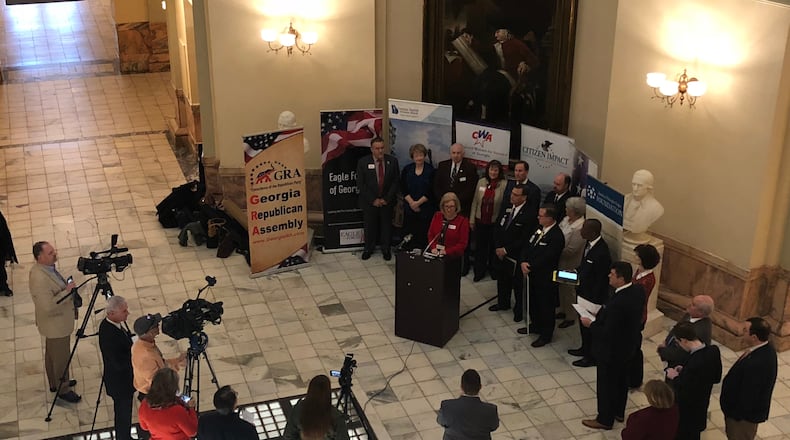Pastors and faith-based groups are pushing for a "religious liberty" bill to be approved this year, arguing it wouldn't result in discrimination or hurt the economy of Georgia, which is bidding to become Amazon's second headquarters.
They said during a press conference in the state Capitol on Tuesday that Georgia should join the 21 other states that have passed legislation prohibiting governments from restricting a person’s exercise of religion unless they show a “compelling government interest.”
But critics of the proposal say it would allow faith-based organizations and businesses to discriminate against gay, lesbian, bisexual and transgender people.
"We are fighting in this state to prevent the government from denying our First Amendment rights," said Garland Hunt, senior pastor of The Father's House in Peachtree Corners. "We renounce discrimination of the people of faith in this state."
Gov. Nathan Deal vetoed a religious liberty bill in 2016, saying it didn't reflect Georgia's welcoming image. Dozens of major companies threatened to boycott the state if the bill became law, and gay rights groups said it could legalize discrimination against them.
Business leaders said Tuesday they will continue to oppose similar legislation this year, saying it's an unnecessary distraction from business growth. They've also said contentious religious liberty debates could damage Georgia's chances of landing Amazon and its 50,000 new jobs.
“While there's no new evidence to suggest this legislation is needed to strengthen a right guaranteed by our Constitution, there is plentiful data other states have suffered and will continue to suffer long-term economic harm for enacting a law that many see as discriminatory,” said Metro Atlanta Chamber lobbyist Katie Kirkpatrick and Georgia Chamber of Commerce lobbyist David Raynor in a joint statement.
During their press conference, religious liberty supporters said they hoped Deal would sign state legislation, Senate Bill 233, that's nearly identical to the federal Religious Freedom Restoration Act approved in 1993. SB233 was introduced last year and is still alive in the state Senate.
"People should be able to live out their faith without interference from the government. it's really pretty simple when you think about it," said Sen. Josh McKoon, R-Columbus. "This debate is not going away until the Legislature and the governor do the right thing and protect this common-sense civil liberty."
About the Author
Keep Reading
The Latest
Featured





